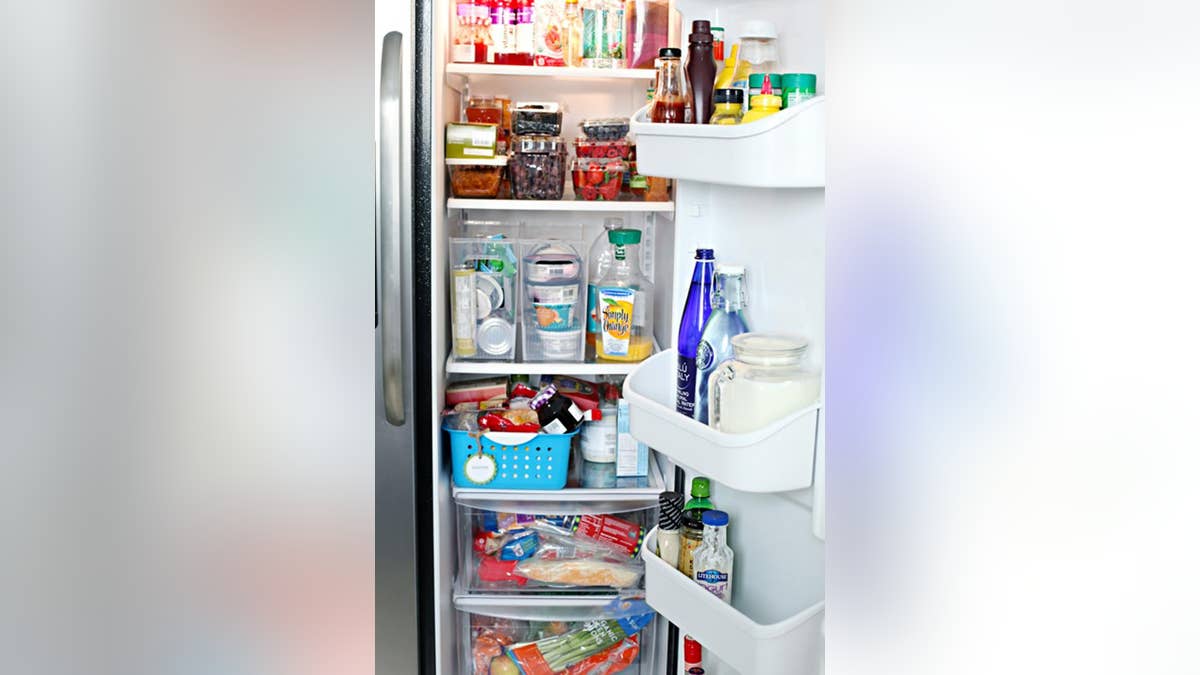
(IHeart Organizing)
Have you ever let your uneaten food pile up in your fridge, or opened the crisper door to discover a nasty odor emanating from God knows what? We've all been there, but for some reason, we were too lazy to clean our fridge before it became a nuisance.
Time for a change.
Here's how to take care of that dirty fridge once and for all (in about 10 minutes a week):
1) Clean Out Your Fridge Weekly
Experts recommend cleaning out your refrigerator once a week. Martha Stewart recommends cleaning spills daily with dishsoap and a sponge. She also advises people wipe down the exterior of refrigerators on a weekly basis with a dish cloth, mild liquid soap and warm water.
2) Keep Food with Expiration Dates In the Front
To keep a clean fridge, it is important to rotate items as restaurants do with walk-in refrigerators. Most foods should be used by their expiration dates, and having these perishable items in the front of the refrigerator makes it is easier to keep track of what you need to eat NOW. (The USDA offers specific guidelines for different types of food.)
3) Get Rid of Spills Instantly
Don't wait until a spill becomes nasty-smelling, or hardens into a gross sticky subtance on refrigerator shelves. As soon as a spill occurs, wipe it up dish soap and a sponge. If a spill has left a bad odor in your fridge, Home Food Safety suggests baking soda as a remedy: "Eliminate odors between cleanings by placing an open box of baking soda in the back of the refrigerator. Replace it every 3 months." Anne Fields, an extension specialist from Michigan State University, recommends washing down the complete interior of the fridge with a baking soda water solution to alleviate stenches that have not dissipated after throwing out expired foods. It that doesn't work, she suggest spreading baking soda on shallow pans and leaving them in the refrigerator until the odor is gone.
4) Keep the Fridge Temperature Constant
According to Kathleen M. Zelman, a registered nutritionist and dietitian, temperature matters. "Post thermometers to ensure that the temperature stays below 40 degrees in the refrigerator," she says. If the temperature rises above 40 degrees, food will begin to spoil rapidly due to increasing rates of bacteria. If the temperature plummets too far below 40 degrees, food can freeze.
5) Store Leftovers Properly
It's no secret that we love our leftovers, but they need to be stored properly to remain fresh. The USDA stresses the importance of wrapping a meal right away to make sure harmful bacteria does not multiply. According to the USDA, leftovers must be wrapped in containers with as little air as possible to keep all pre-existing bacteria out. Once the meal is wrapped, it should be dated, since leftovers have a short lifespan of between three days to three months. Once wrapped and dated, refrigerate immediately.
6) Keep Raw Meats Down Low
There is a very big difference between cooked and raw meat; cooked meat has burned away most of the juices and bacteria, while raw meat has not. The Food Services department of the New York Division of Military and Naval Affairs advises that raw meats should always be stored on one of the bottom drawers of the fridge to prevent undesired drippage or cross-contamination. According to Diane Van, a food safety and inspection services specialist, refrigerated raw meat can last up to two days, while refrigerated cooked meats can be stored up to four. The best rule of thumb for meat is that if you're not planning to eat it soon, freeze it.
7) Use Your Senses
Most items that are stored in refrigerators do not have expiration dates, so it is important when cleaning out these items that you use your smell, sight and taste to determine if these items need to stay or go. If one of these senses gives off a bad vibe, immediately toss the food.
8) Throw Out What You Won't Eat
While this may seem self explainatory, people choose to neglect unwanted foods, forcing them into the deepest corners of the fridge. Not only does this cause unnecessary clutter in the refrigerator, it also enables bacterial growth and bad odor to thrive.







































